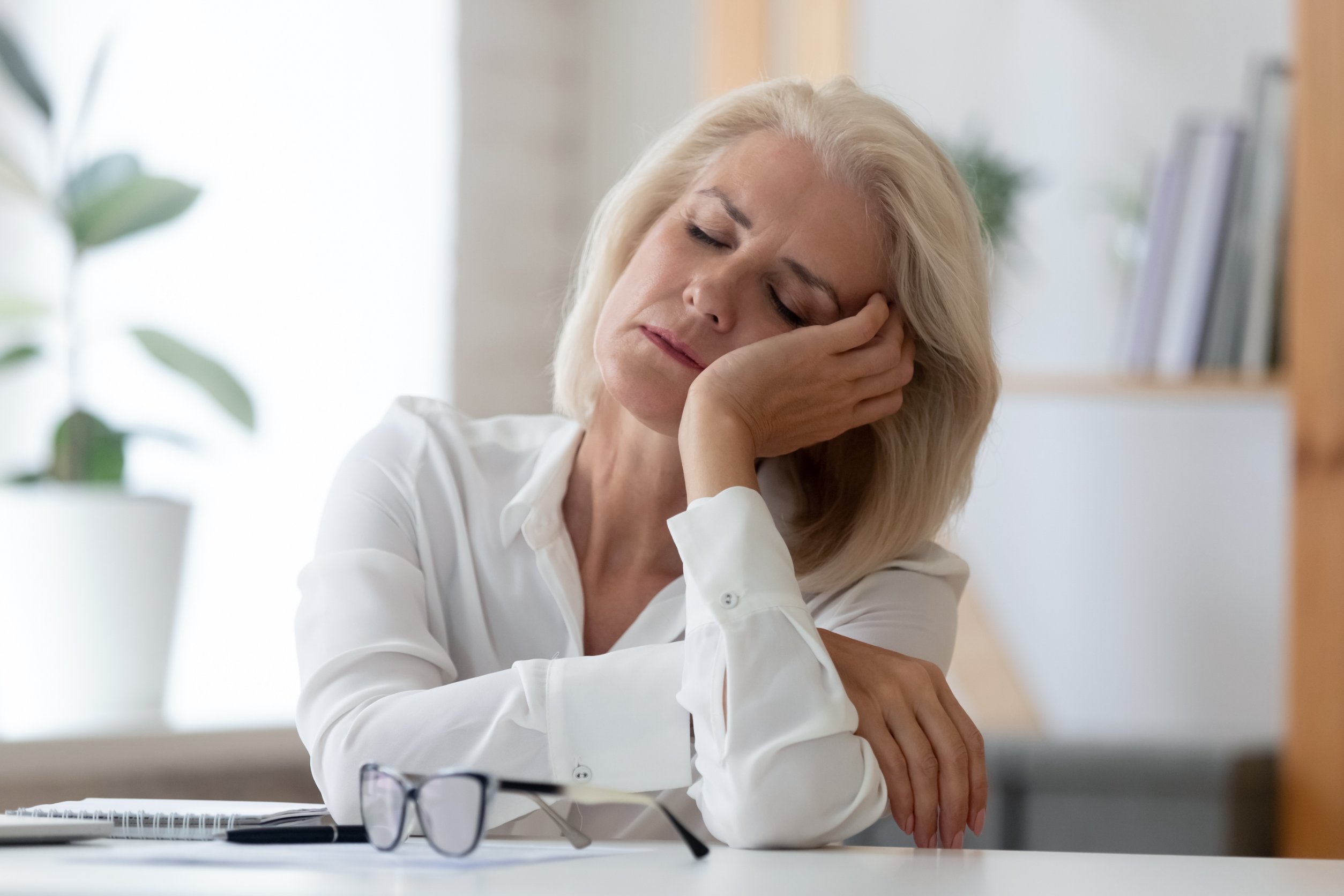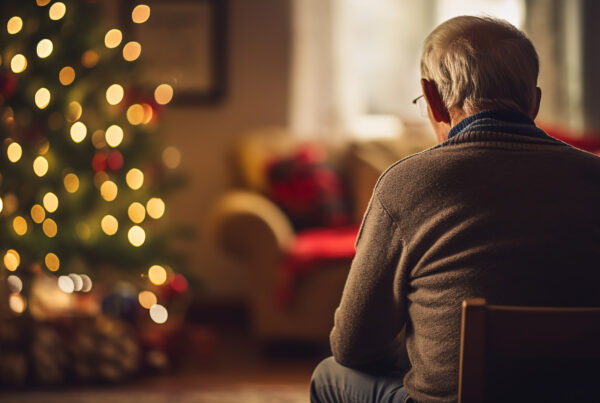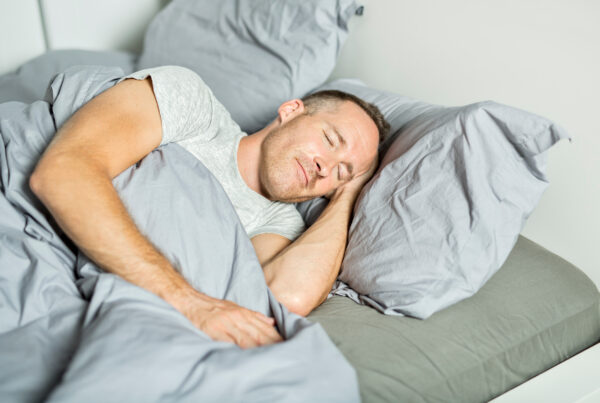”Question: Is there anything I need to be aware of as I age and my sleep routines change?
Reading Time: 5 Minutes
MWi Hacks:
- Learn how sleep changes as we age and how you can best support your sleep health.
MWi Summary:
- Although everyone’s experience is unique, research has shown sleep schedules shift, napping increases, and it takes longer to recover from sleep schedule disruptions.
- Common issues older adults face which affect sleep include insomnia, nighttime urination, pain, and sleep apnea.
- Some tips that can improve sleep include exercise, reducing bedroom distractions, keeping a regular sleep schedule, and creating a bedtime routine.
How Does Aging Affect Sleep?
Aging affects people differently. While some older adults may have no significant disruptions in their sleep, others complain about getting less sleep and having worse sleep quality. Experts have found several common sleep disturbances in older adults:
- Shifting sleep schedule: As people age, the body’s circadian rhythms actually shift forward in time. This shift is called a phase advance. Many older adults experience this phase advance as getting tired earlier in the afternoon and waking up earlier in the morning.
- Waking up at night: Research has also shown that as people get older, they often experience changes in their sleep architecture. Sleep architecture refers to how people cycle through the different stages of sleep. Older adults spend more time in the earlier, lighter stages of sleep and less time in the later, deeper stages. These shifts may contribute to older people waking up more often during the night7 and having more fragmented, less restful sleep.
- Daytime napping: Research estimates that about 25% of older adults take naps, compared with around 8% of younger adults8. While some experts suggest that a short daytime nap may be beneficial, many agree that extended napping and napping later in the day can make it harder to fall asleep at bedtime and create nighttime sleep disruptions.
- Longer recovery from changes in sleep schedule: Alterations in how the body regulates circadian rhythms make it more difficult for older people to adjust to sudden changes in their sleep schedules, like during daylight savings time or when experiencing jet lag.
Do Older People Need Less Sleep?
According to the National Institution on Aging, it is considered a myth9 that older adults require less sleep than younger individuals. Many older adults have a hard time getting the sleep they need, but that doesn’t mean they need less sleep. The amount of sleep that a person needs can decrease from infancy to adulthood, but this trend appears to stop around age 60. The National Sleep Foundation guidelines10 advise that people over 65 should get seven to eight hours of sleep each night.
Common Sleep Issues in Seniors
Researchers estimate that between 40% and 70% of older adults have chronic sleep issues and up to half of cases may be undiagnosed11. Chronic sleep problems can significantly interfere with older adult’s daily activities and reduce their quality of life. Common sleep issues in older adults include:
- Pain: Discomfort and pain can lead to inadequate rest for some older adults. Pain and sleeplessness can become a vicious cycle, in which less sleep can lead to more pain, so it’s important to talk to a doctor if pain is interfering with sleep.
- Nighttime urination: Nighttime urination, also called nocturia, increases with age due to physical changes in the urinary system among other factors. This issue may affect up to 80% of older adults12, contributing to increased sleep disruptions.
- Insomnia: Having persistent difficulty in falling or staying asleep is one of the most common sleep issues in older adults. Insomnia may be caused by a variety of overlapping factors but can get better with treatment.
- Daytime drowsiness: Many people believe that feeling tired during the day is a normal part of getting older, but this is not the case. Around 20% of older people experience excessive daytime sleepiness, which may be a sign of an underlying health condition rather than merely old age. Excessive daytime sleepiness in older adults may be a symptom of health issues like sleep apnea, cognitive impairment, or cardiovascular issues.
- Sleep Apnea: Obstructive sleep apnea can cause pauses in breathing during sleep. These pauses are related to a repeated collapse (apnea) or partial collapse (hypopnea) of the upper airway. Sleep apnea causes fragmented sleep and can affect oxygen levels in the body, leading to headaches, daytime sleepiness, and difficulty thinking clearly.
- Restless Leg Syndrome: Restless leg syndrome (RLS) affects 9% to 20% of older people, while periodic limb movements of sleep (PLMS) affects 4% to 11%13. RLS causes an urge to move the legs while resting or sleeping. PLMS causes involuntary movements in the lower limbs, most commonly in the feet. Both disorders can significantly impact sleep and overall quality of life.
- REM sleep behavior disorder: REM sleep behavior disorder (RBD) primarily affects older people. While most people’s bodies are still while they’re dreaming, this disorder can cause people to act out their dreams, sometimes violently.
Sleep Tips for Seniors
Research has shown that older people can take steps to improve their sleep. These steps often involve focusing on improving sleep hygiene and developing habits that encourage quality sleep. Here are a few tips for getting a better night’s rest in your golden years:
- Exercise: Older people who exercise regularly fall asleep faster, sleep longer, and report better quality of sleep. Exercise is one of the best things older people can do for their health. The National Institute of Aging offers helpful tips for exercising safely as an older person.
- Reduce bedroom distractions: Televisions, cellphones, and bright lights can make it more challenging to fall asleep. Keep the television in another room and try not to fall asleep with it turned on. Move electronics out of the bedroom and reserve the bedroom for only sleeping and sex.
- Avoid substances that discourage sleep: Substances like alcohol, tobacco, caffeine, and even large meals late in the day can make sleep more challenging. Try quitting smoking, reducing caffeine intake, and eating dinner at least four hours before bedtime.
- Keep a regular sleep schedule: Remember that aging makes it more difficult to recover from lost sleep. Avoid sudden changes in sleep schedules. This means going to bed and waking up at the same time every day and being careful about napping too long.
- Develop a bedtime routine: Find activities that help you relax before bed. Many older people enjoy a bath, reading, or finding some quiet time before getting into bed.
MWi would like to thank the Sleep Foundation for the expert insights that we were able to share with our community. To read the original article click the button below!






